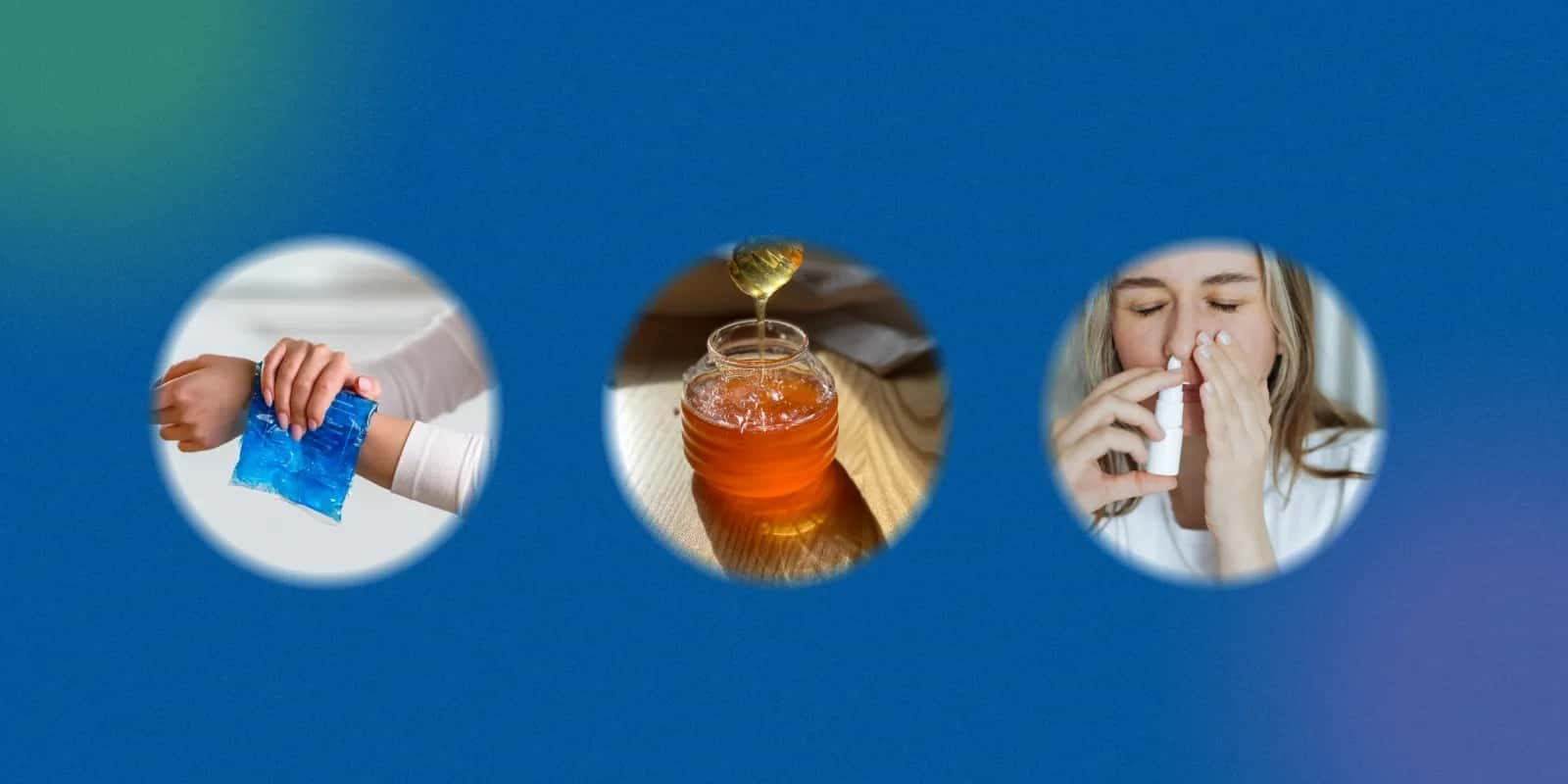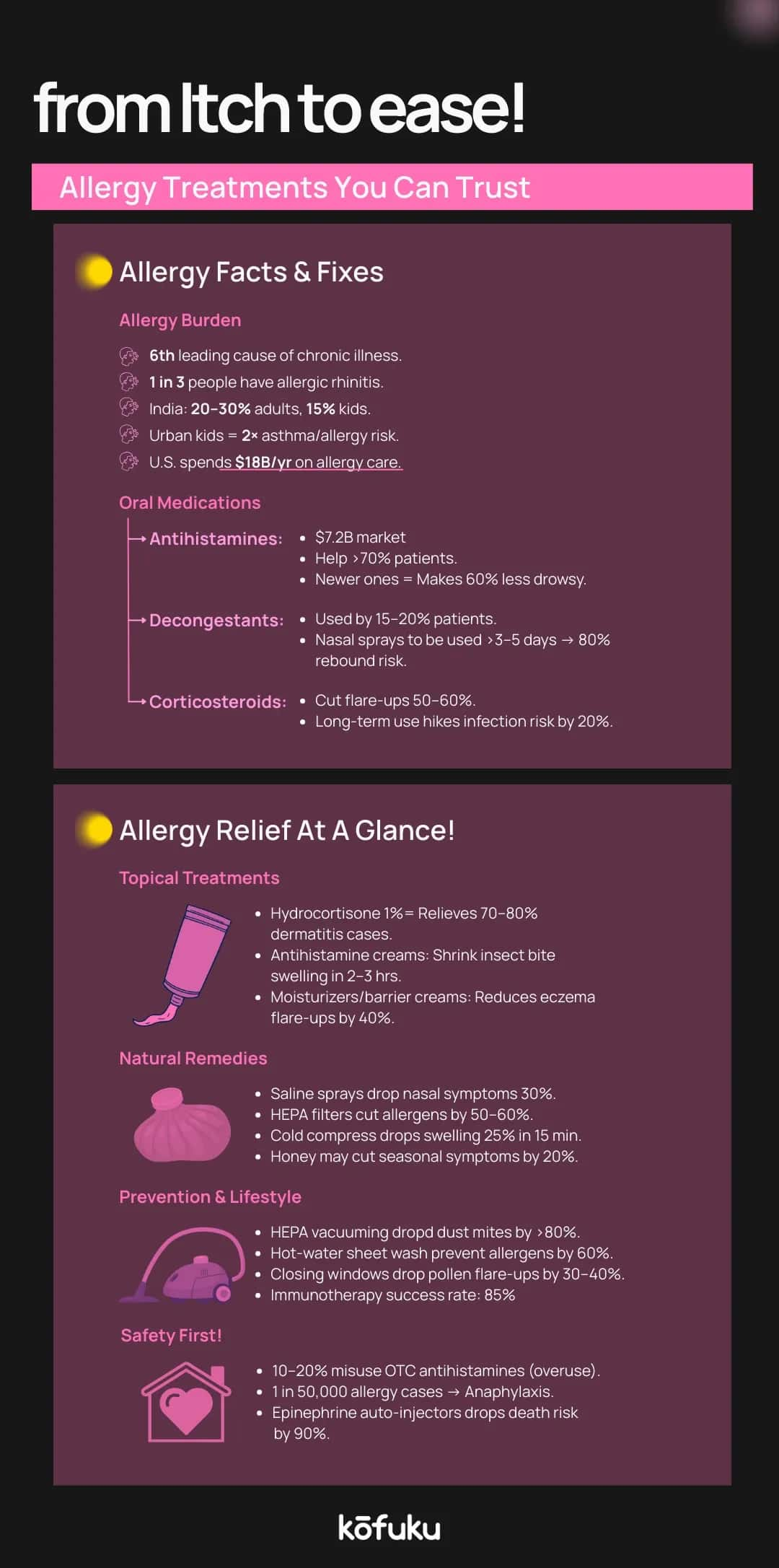Your Guide to Allergy Medications: Tablets, Creams, and Remedies

Introduction
Something that you can catch with just a blink of an eye are allergies, and it's already allergy season in India. With monsoon all over, chilly weather, and people with runny noses around, you should be more careful than ever.
If you are experiencing red, itchy eyes and sneezing, then you have caught allergies. An allergy is a body’s reaction to an otherwise innocent substance (like pollen) that the body identifies as an invader. Interaction with such triggers starts your body’s immune response, which fights it by releasing chemicals such as histamine.
Though there are several home remedies, modern medication has also evolved, and you can now find many options in the form of tablets, creams, aerosols, and even powders that will provide an effective alleviation against allergens. But how do you choose one?
Knowing how to decide the best allergy medicine for cough, tablet for skin allergy, face allergy tablet, which dust allergy tablet to take, and most importantly, what are the home remedies for sneeze allergy is important, especially in peak allergy season.
In this blog, you will know everything you need to prepare yourself for this allergy season and keep yourself safe and protected. This guide will explain how allergy medications work, the best tablet for skin allergy, and cream, what allergy powders are, the best face allergy tablet, and safe home remedies for sneezing, so that you can make an informed choice with the advice of your doctor.
Understanding Allergies: Types and Common Triggers
Allergies happen when the immune system reacts to harmless substances as if they were dangerous. Common allergens include:
- Dust mites
- Pollen
- Pet dander
- Certain foods
- Insect bites
- Skin irritants like nickel or fragrances
Allergies may include various symptoms, such as sneezing, tears, skin rashes, cough, and even swelling. Chronic allergies can also aggravate asthma and other airway disorders, so it’s crucial to visit a good allergy and asthma treatment centre.
How Allergy Medicines Work: Pills, Creams, Powders, and More
Allergy medicines work by reducing the body’s reaction to allergens. Common types include:
- Antihistamines: Block histamine, the chemical responsible for allergy symptoms.
- Corticosteroids: Reduce inflammation in the skin or the nasal passages.
- Decongestants: Relieve blocked noses in short-term allergy flare-ups.
- Soothing creams and ointments: Relieve itching and redness from skin allergies.
- Allergy powders: Used in some cases for skin application or dust control.
The selection of the form is predetermined by the nature of the allergy, its intensity, and local or systemic character (skin rash or sneezing, wet eyes).

Top Tablets for Dust and Skin Allergy: Your Options Explained
Best Dust Allergy Tablets and How to Use Them
Antihistamines such as cetirizine, loratadine, or fexofenadine are typically found in dust allergy tablets. These are involved in reducing the histamine reaction caused by the allergens of dust mites. Active ingredients: Cetirizine 10mg, Loratadine 10mg, Fexofenadine 120 mg When used: Sneezing, nasal congestion, itchy eyes from dust exposure Note: Avoid long-term daily use without medical supervision.
Skin Allergy Tablet List: Effective Choices for Relief
A tablet for skin allergies can help alleviate symptoms such as redness, burning, or swelling resulting from insect bites, rashes, or contact dermatitis.
Common active ingredients:
- Cetirizine (non-drowsy)
- Hydroxyzine (sedating, for intense itching)
- Levocetirizine (low-sedation antihistamine)
Face Allergy Tablet: When Is It Needed?
Cosmetics, jewellery, sunscreen, and environmental factors may become the causes of face allergies. Generally, antihistamine face allergy tablets don’t cause drowsiness during the day.
Skin Allergy Creams: Best Picks for Soothing Rashes
Skin Allergy Cream List: Ingredients and How They Help
Skin allergy creams often contain:
- Hydrocortisone: Reduces inflammation and redness.
- Calamine lotion: Soothes itching.
- Antihistamine creams: Block local allergic reactions.
- Moisturising bases: Repair skin barrier.
How to Choose a Skin Allergy Cream for Your Needs
- Mild rashes: Calamine or aloe-based creams
- Moderate itching: Antihistamine cream
- Inflamed skin: Low-strength steroid cream (doctor-prescribed)
- Dry, cracked skin: Emollient-rich cream
Allergy Powder: What Is It and When to Use
Allergy powders are not as common as tablets or creams, but they can:
- Help dry out oozing skin rashes.
- Be sprinkled in bedding to reduce dust mite exposure (specialised medical-grade powders).
Always check ingredients, especially if you have sensitive skin.
Best Allergy Medicine for Cough and Other Symptoms
In cases where a cough is caused by allergies (usually due to post-nasal drip), it may be effectively treated with a combination of an antihistamine and a modest decongestant. The most appropriate cough allergy drug depends on whether the cough occurs due to allergy or infection; a distinction that your doctor should make.

Sneeze Allergy Home Remedies: Simple Steps at Home
Home Remedies for Sneezing: Steam, Honey, and Turmeric
- Steam inhalation: Clears nasal passages.
- Warm turmeric milk: Traditional anti-inflammatory drink.
- Saline nasal spray: Reduces nasal irritation.
Tips for Managing Allergies at Home
- Keep bedding clean and sun-dried.
- Use air purifiers in high-pollen seasons.
- Wear sunglasses outdoors to protect your eyes from allergens.
Finding Help: Best Allergy Clinic & Asthma Treatment Centres
When symptoms persist or worsen, it is advisable to consult an allergy and asthma treatment centre. In the allergy and asthma treatment centre, the following will be conducted:
- Skin prick tests
- Blood allergy profiles
- Lung function tests (if asthma is suspected)
Top Tips for Choosing the Right Allergy Doctor
- Check if the clinic offers both diagnosis and treatment in one place.
- Ensure they provide customised treatment plans.
- Look for specialists who handle both allergy and asthma management.
Best Allergy Clinic and Centres: Where to Start
It is vital to find the appropriate allergy and asthma treatment centre for the diagnosis and treatment of the conditions. Look for reputable facilities that have qualified allergists and immunologists and provide full-service amenities, including skin tests, blood tests, and individual treatment plans.
Consider the recommendations by your primary care physician, patient reviews, and clinic accreditations. A significant number of the centres of prominence also offer specialised services for asthma and chronic respiratory ailments.
Make sure the clinic has emergency allergy mishandling facilities and that medical procedures are up to date.
Disclaimer: Always seek professional medical advice before starting any allergy treatment.

FAQs
Q. What is the best tablet for dust allergy?
A. The best tablet for dust allergy depends on your symptoms and medical history. Commonly prescribed antihistamines or decongestants help relieve sneezing, itching, and congestion. Always consult a doctor before starting any allergy medication.
Q. Which cream works best for skin allergy rashes?
A. Topical creams with antihistamines, hydrocortisone, or soothing agents like aloe vera can reduce itching and redness. The best choice depends on rash severity and skin sensitivity. Use only as prescribed by a qualified dermatologist.
Q. What are the top tablets for face allergy relief?
A. Face allergy tablets often include non-drowsy antihistamines to control swelling, redness, and itching. Loratadine, cetirizine, or fexofenadine may be prescribed, but the right option varies per individual. Always seek medical guidance for safe and effective use.
Q. Which is the best allergy medicine for cough and sneezing?
A. Antihistamines combined with decongestants or expectorants can help with allergy-related cough and sneezing. The best choice depends on allergy type and severity. Avoid self-medicating; get a doctor’s prescription for the most effective treatment.
Q. What are some sneeze allergy home remedies that work?
A. Effective sneeze allergy remedies include steam inhalation, drinking warm turmeric milk, using a saline nasal rinse, and avoiding known allergens. These help relieve symptoms but should complement, not replace, professional medical treatment.
Q. What is allergy powder, and when should I use it?
A. Allergy powder typically refers to medicated or herbal powders that soothe skin irritation caused by allergies. It can be used for mild rashes or itching, but should only be applied after consulting a healthcare professional.
Q. What are the most effective tablets for skin allergies?
A. Effective skin allergy tablets usually include antihistamines that reduce itching, redness, and swelling. Depending on the cause, your doctor may also prescribe corticosteroids. Never use allergy tablets without professional evaluation to avoid side effects.
Q. Where can I find the best allergy clinic near me?
A. Search online for allergy clinics with high patient ratings, certified allergists, and advanced diagnostic tools. You can also request referrals from your primary care physician for trusted, specialised allergy and asthma treatment centres.
Q. Who is the best doctor for allergy treatment in my city?
A. The best allergy doctor will be a board-certified allergist or immunologist with experience in your specific allergy type. Check patient reviews, credentials, and hospital affiliations before booking a consultation for personalised care.





